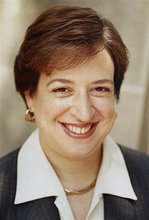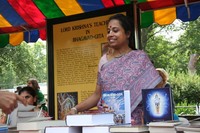 President Obama’s pick of Solicitor General Elena Kagan to become the
President Obama’s pick of Solicitor General Elena Kagan to become the
newest Supreme Court Justice raises a number of questions and presents
the media with a number of story angles. One of the earliest of these,
back when the Kagan pick was merely speculation, was the fact that
Kagan’s addition to the bench would render it — for the first time in
history — without a Protestant Christian. In a country that is
majority Protestant (and one which many people feel was founded as a
Protestant Christian nation), what are the implications of that?
Of course the religion angle has been quickly replaced by more heated
debate about Kagan’s resume (read: She’s never been a
judge.) and juicier questions about her lifestyle and sexual orientation
(read: Is she gay? Does it matter?).
But the role that Kagan’s religion (she’s Jewish) — and the religion
of all the Supremes — plays is interesting and important to look at.
Try as we might to pretend to the contrary, judges are a product of what they believe.
Newbie Justice Sonia Sotomayor took heat for suggesting that her Latina
identity gave her a unique ability to empathize, but maybe she was on
to something. Culture and background colors the way we think and act and see things.
How much more so, then, might religion play a role? Surely, the way judges approach the law is inextricably tied to what they believe about The Law. Heck, any honest legal scholar will admit that its practically impossible to discuss one without the other.
Still, a Protestant-free Supreme Court is academically fascinating but probably won’t cause too much of a stir. Kagan’s Judaism will likely be as much of a non-issue as it was with other Jewish justices, like Ginsburg and Breyer, before her. The truth is that their more similarities in their understanding of The Law then there are differences. In embracing the Hebrew Bible (“Old Testament”) Jews, Catholics, and Protestants all lay claim to the same foundational sacred canon. They are all “people of the Book,” as some might say.
But what would happen if a person of an entirely different Book were nominated? What if he or she were a Hindu or Buddhist, for instance? Would such a nominee’s faith become a critical factor, even if they were otherwise qualified? As much as I’d like to believe that it wouldn’t, I know that it would. As a country, I’m not quite sure that we are there yet.
Bhaktivinode Thakura, a Hindu theologian and reformer, once longed for a day when the “high-court judges” would proudly sit on the bench with tilak (also called tika, a sacred marking) on their heads. Of course Bhaktivinode was writing at the turn of the 19th century, in an India ruled over by the British. But I think his point also has relevance for us so many years later, on the other side of the globe. His vision was not for religion to be checked at the door. He wanted those who decided the law to do so with their full selves, unapologetically but appropriately bringing who they are to their work.
Hopefully, Elena Kagan will do just that.

